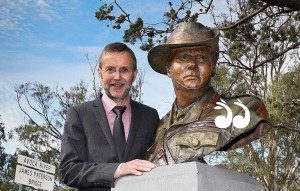1918: When Australian Soldiers Changed History
WHILE Gallipoli is etched in the Australian psyche as the epitome of the ANZAC spirit, Australian troops changed the course of history when they turned back the tide of the advancing German army in a series of battles across the western front in 1918 and it is these battles and stories of 1918 that author and historian Ross McMullin is passionate about becoming just as much a part of the ANZAC story as Gallipoli.
Ross will be discussing what made the Australian soldiers so remarkable at the Scone Literary Festival this weekend and fittingly present “Ode to the Fallen” on Sunday, Armistice Day.
“In 1918, my view is the Australian soldiers influences the destiny of the world more than any other year in history, this was our international contribution,” said Mr McMullin.
“In 1918 there were two phases, the first was when there was a massive attack by the Germans in a desperate attempt to win the war, the British were driven back 40 miles, which is a long way in the context that it had been stagnant for years and there was widespread concern that the war could be lost and Australia was rushed to the rescue for the defence,” he said.
“The second phase was the offence and it played a significant role as well,” Ross McMullin said.
Ross said by this stage of World War I the Australian soldiers were described as very proficient, brave and skillful because they had learned lessons in previous theatres.
At the same time the British army had lost most of their experienced soldiers and their front lines were held by younger relatively inexperienced soldiers.
Combining with that the moral damage the Germans inflicted by rolling them back 40 miles leaving the British army in disarray.
“It was striking how much in this emergency the Australian moral was overall very good, they were outstanding in a crisis and many of the soldiers expressed that they preferred the situation of the German’s coming at them,” said Ross.
“The shoe was on the other foot and our blokes were quite looking forward to that situation, most of them enlisted to stop the Germans rampaging across Europe and that made them fairly buoyant going into battle,” he said.
Australia’s most famous fighting general, Harold “Pompey” Elliott led a 7th battalion into Gallipoli and later the 15th brigade on the Western Front.
Pompey was the subject of a book by Ross McMullin who was taken by his extraordinarily frank and forthright, but often controversial and emotional accounts of WWI.
“Harold Elliott wrote that while he’d been brought up in a strongly English educaiton system, he found while he was over there (France) he felt he ended up more in tune and instinctively inline with the French more than the British and the New Zealand, Canadian and other colonials were saying similar things,” said Ross.
“The French people still recognise in a widespread way the Australian contribution they are admiring and grateful and astonished by it,” he said.
“They often say ‘your country is so far away, what were you doing here?’,” he said.
“They were grateful and the time and they still are,” Ross McMullin said.
Ross will be presenting “Ode to the Fallen” at 10:15am on Sunday at the Scone Literary Festival, tickets are still available.
Visit the Scone Literary Festival for more detail.
Books by Ross McMulin include:
 scone.com.au
scone.com.au